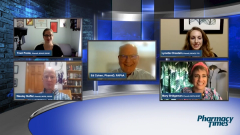
Managing Increasingly Demanding Workflows for Pharmacists and Technicians
Expanding technician roles may lead to improved efficacy in the workplace and alleviate burdens overwhelming pharmacists.
Episodes in this series

Ed Cohen, PharmD, FAPhA: For our final thought, what advice do you have for community clinicians, pharmacists, and technicians for managing their workflow and the demand of this expanded immunization service that we’re providing? Mary, I’ll start with you.
Mary Bridgeman, PharmD, BCPS, BCGP: I’d be remiss if I didn’t point out that vaccination rates for many communicable diseases across various age and demographic groups remain low across the United States. As the most accessible health care professionals, we have an obligation to protect and support the public health and to educate and advocate for our patients to receive indicated vaccines. It’s important that we pause and address our patients’ questions. We need to hear their concerns with compassion and share reputable information to allow them to make an informed health care decision. That’s the best way we can combat hesitancy and support the health and well-being of the patients we serve.
I’m reflecting on the words of former US Surgeon General Jerome Adams, who said, “It’s OK to have questions. What’s not OK is to make poor health decisions based on misinformation.” It’s our professional obligation to share what we know to combat these false beliefs in the interest of public health.
Wesley Nuffer, PharmD, BCPS, CDCES: I echo what Mary said. To paraphrase another quote, “The only thing that evil needs to grow is for good men to do nothing.” That extends to good people. I have also been very frustrated at seeing some of the misinformation that’s put out there. I try not to wade into the pools and get involved, but sometimes we need to remember that it’s our responsibility to make sure accurate information gets out there and that people aren’t only hearing this dissentive voice that breaks down good communication and builds up barriers. As a society, we wrestle with that a lot.
Compassion, doing what you can, and finding what motivates you and refuels you are important. Because as we’ve talked about, it’s a very taxing time. Take time, read a trashy novel, or binge your favorite show and recharge your batteries and go out and fight another day. Because the work we’re doing is tremendously important. Ed, you opened with how far we’ve come as a profession during this pandemic. People finally recognize the critical role that we hold as pharmacists within public health. We need to continue that momentum and build it. To Mary’s point, there’s so much more work to do, so let’s continue to do it.
Lynette Chastain, PharmD, BCACP, TTS: Training staff [is important]. We talked about technicians taking on the role of immunizing. A lot of pharmacies have been great at that, but some haven’t taken advantage of that. Being willing to take the time to train someone else to ultimately make your work load a little easier might help us in the end.
Traci Poole, PharmD, BCACP, BCGP: Identify an immunization champion within your location—whether it’s a technician or a pharmacist—who keeps the wheels on the bus all the time. Also use technology and automation where possible. Even if it’s a bit of money, it’s worth it in the end to give your staff some sanity and a bit of a break from all the tedious things that have to be done. I know pharmacists are tired and technicians are exhausted, but it’s our duty as professionals to immunize these patients to keep the public safe and healthy. As Wes said, whatever you have to do to unplug and take care of yourself to be able to do that [is important]. The last thing is that you need to take care of yourself. We realize that life happens, and you don’t always have to do it with a smile on your face, but it’s our responsibility and we can’t let up. Because this thing isn’t necessarily over, and the public needs us.
Lynette Chastain, PharmD, BCACP, TTS: Also, make sure that those who are immunizing have the information they need. As these new boosters come out, make sure every member of your team is aware and doesn’t feel left out. If a patient comes and tells you they’re due for a booster and you didn’t realize that was available, you look a little silly. If we can, we should spread that news before our patients come to us with it.
Ed Cohen, PharmD, FAPhA: I want to take a moment to say thank you to all of you today. My panel of distinguished colleagues, thank you for a wonderful discussion. To our viewing audience, we hope you found this Pharmacy Times® webcast to be rich and informative. Thank you all very much.
Transcript edited for clarity.
Newsletter
Stay informed on drug updates, treatment guidelines, and pharmacy practice trends—subscribe to Pharmacy Times for weekly clinical insights.


























